
The Eighteenth Amendment to the United States Constitution established the prohibition of alcohol in the United States. The amendment was proposed by Congress on December 18, 1917, and ratified by the requisite number of states on January 16, 1919. The Eighteenth Amendment was repealed by the Twenty-first Amendment on December 5, 1933—the only constitutional amendment in American history to be repealed.

The Lost Weekend is a 1945 American drama film noir directed by Billy Wilder, and starring Ray Milland and Jane Wyman. It was based on Charles R. Jackson's 1944 novel of the same name about an alcoholic writer. The film was nominated for seven Academy Awards and won four: Best Picture, Best Director, Best Actor, and Best Adapted Screenplay. It also shared the Grand Prix at the first Cannes Film Festival, making it one of only three films—the other two being Marty (1955) and Parasite (2019)—to win both the Academy Award for Best Picture and the highest award at Cannes.

A speakeasy, also called a blind pig or blind tiger, was an illicit establishment that sold alcoholic beverages. The term may also refer to a retro style bar that replicates aspects of historical speakeasies.
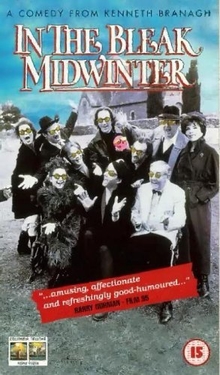
In the Bleak Midwinter is a 1995 British romantic comedy film written and directed by Kenneth Branagh. Many of the roles in the film were written for specific actors. This was the first film directed by Branagh in which he did not appear.
The Bureau of Prohibition was the United States federal law enforcement agency formed to enforce the National Prohibition Act of 1919, commonly known as the Volstead Act, which enforced the 18th Amendment to the United States Constitution regarding the prohibition of the manufacture, sale, and transportation of alcoholic beverages. When it was first established in 1920, it was a unit of the Bureau of Internal Revenue. On April 1, 1927, it became an independent entity within the Department of the Treasury, changing its name from the Prohibition Unit to the Bureau of Prohibition. In 1930, it became part of the Department of Justice. By 1933, with the repeal of Prohibition imminent, it was briefly absorbed into the FBI, or "Bureau of Investigation" as it was then called, and became the Bureau's "Alcohol Beverage Unit," though, for practical purposes it continued to operate as a separate agency. Very shortly after that, once repeal became a reality, and the only federal laws regarding alcoholic beverages being their taxation, it was switched back to Treasury, where it was renamed the Alcohol Tax Unit.
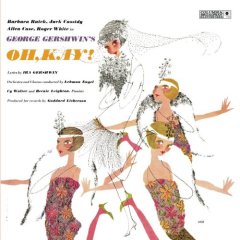
Oh, Kay! is a musical with music by George Gershwin, lyrics by Ira Gershwin, and a book by Guy Bolton and P. G. Wodehouse. It is based on the play La Présidente by Maurice Hennequin and Pierre Veber. The plot revolves around the adventures of the Duke of Durham and his sister, Lady Kay, English bootleggers in Prohibition Era America. Kay finds herself falling in love with a man who seems unavailable. The show is remembered for its enduring song, "Someone to Watch Over Me".
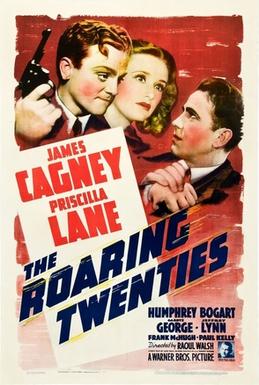
The Roaring Twenties is a 1939 American crime thriller film directed by Raoul Walsh and starring James Cagney, Priscilla Lane, Humphrey Bogart, and Gladys George. The film, spanning the period from 1919 to 1933, was written by Jerry Wald, Richard Macaulay and Robert Rossen. The film follows three men and their experiences during major events in the 1920s, such as Prohibition era violence and the 1929 stock market crash.
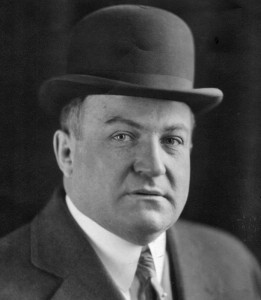
George Remus was a German-born American lawyer who was a bootlegger during the early days of Prohibition, and later murdered his wife Imogene.
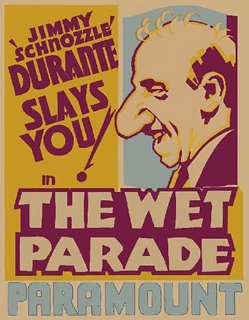
The Wet Parade is a 1932 American pre-Code drama film directed by Victor Fleming and starring Robert Young, Myrna Loy, Walter Huston, Lewis Stone and Jimmy Durante. It is based on the 1931 novel by Upton Sinclair. The film shows how two families are devastated by the effects of alcohol consumption and Prohibition. In addition to the main story, many small vignettes illustrate the theme, such as a three-minute segment that documents the many steps in the creation of counterfeit imported liquor. When the film was released in March 1932, Prohibition had been law for almost 13 years and would not end until December 5, 1933 with the passage of the 21st Amendment.

Vernon Bruce Dent was an American comic actor, who appeared in over 400 films. He co-starred in many short films for Columbia Pictures, frequently as the foil, main antagonist, and an ally to The Three Stooges.

Night World is a 1932 American pre-Code drama film featuring Lew Ayres, Mae Clarke, and Boris Karloff. The supporting cast includes George Raft and Hedda Hopper.

The Gay Bride is a 1934 gangster film-screwball comedy starring Carole Lombard as a wisecracking gold-digger and Chester Morris as the poor man she despises. It was directed by Jack Conway and written by the husband-and-wife team of Sam and Bella Spewak, based on the story "Repeal" by Charles Francis Coe.

Cheyenne's Pal is a 1917 American silent Western film directed by John Ford and featuring Harry Carey. The film is considered to be lost.

Gertrude Olmstead was an American actress of the silent era. She appeared in 56 films between 1920 and 1929. Her last name was sometimes seen as Olmsted.

The Prohibition era was the period from 1920 to 1933 when the United States prohibited the production, importation, transportation and sale of alcoholic beverages. The alcohol industry was curtailed by a succession of state legislatures, and finally ended nationwide under the Eighteenth Amendment to the United States Constitution, ratified on January 16, 1919. Prohibition ended with the ratification of the Twenty-first Amendment, which repealed the Eighteenth Amendment on December 5, 1933.
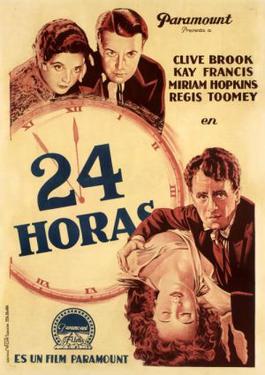
24 Hours is a 1931 American pre-Code romantic drama film directed by Marion Gering and starring Clive Brook, Kay Francis, Miriam Hopkins and Regis Toomey. It was based on the novel Twenty-Four Hours by Louis Bromfield and the play Shattered Glass by Will D. Lengle and Lew Levenson. In the film, an alcoholic married man is accused of murdering the woman with whom he has been carrying on an affair. The title comes from the fact that the film takes place from 11 pm one night to the same time the following night.
Monte Carlo is a 1926 American silent romantic comedy film directed by Christy Cabanne and starring Lew Cody. It was produced by and distributed through Metro-Goldwyn-Mayer.

Rose-Marie is a 1928 American silent drama film directed by Lucien Hubbard. It was the first of three Metro-Goldwyn-Mayer adaptations of the 1924 operetta Broadway musical Rose-Marie. The best-known film adaptation starring Nelson Eddy and Jeanette MacDonald was released in 1936; another film was released in 1954. All three versions are set in the Canadian wilderness.

Oklahoma Beer Act of 1933 is a United States public law legalizing the manufacture, possession, and sale of low-point beer in the State of Oklahoma. The Act of Congress cites the federal statute is binding with the cast of legal votes by the State of Oklahoma constituents or legislative action by the Oklahoma Legislature.

California Straight Ahead is a 1925 American silent comedy film directed by Harry A. Pollard and starring Reginald Denny, Gertrude Olmstead, and Tom Wilson.


















